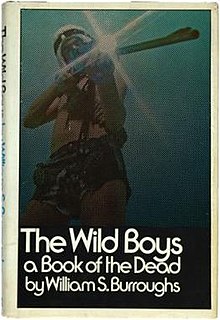
Brion Gysin was a British-Canadian painter, writer, sound poet, performance artist and inventor of experimental devices.

The cut-up technique is an aleatory narrative technique in which a written text is cut up and rearranged to create a new text. The concept can be traced to the Dadaists of the 1920s, but it was developed and popularized in the 1950s and early 1960s, especially by writer William Burroughs. It has since been used in a wide variety of contexts.

Joy Division were an English rock band formed in Salford in 1976. The group consisted of vocalist, guitarist and lyricist Ian Curtis, guitarist and keyboardist Bernard Sumner, bassist Peter Hook and drummer Stephen Morris.

William Seward Burroughs II was an American writer and visual artist. He is widely considered a primary figure of the Beat Generation and a major postmodern author who influenced popular culture and literature. Burroughs wrote 18 novels and novellas, six collections of short stories, and four collections of essays. Five books of his interviews and correspondences have also been published. He was initially briefly known by the pen name William Lee. He also collaborated on projects and recordings with numerous performers and musicians, made many appearances in films, and created and exhibited thousands of visual artworks, including his celebrated "shotgun art".
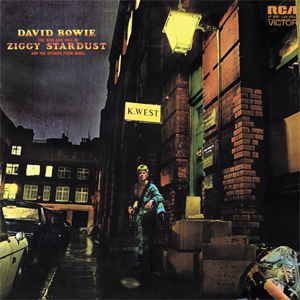
The Rise and Fall of Ziggy Stardust and the Spiders from Mars is the fifth studio album by the English musician David Bowie, released on 16 June 1972 in the United Kingdom through RCA Records. It was co-produced by Bowie and Ken Scott and features Bowie's backing band the Spiders from Mars — Mick Ronson (guitar), Trevor Bolder (bass) and Mick Woodmansey (drums). It was recorded from November 1971 to February 1972 at Trident Studios in London.
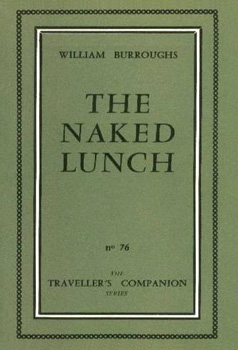
Naked Lunch is a 1959 antinovel by American author William S. Burroughs. The antinovel does not follow a clear linear plot, but is instead structured as a series of non-chronological "routines". Many of these routines follow William Lee, an opioid addict who travels to the surreal city of Interzone and begins working for the organization "Islam Inc."

The Soft Machine is a 1961 novel by American author William S. Burroughs. It was originally composed using the cut-up technique partly from manuscripts belonging to The Word Hoard. It is the first part of The Nova Trilogy.
The Wild Party is a book-length narrative poem, written by Joseph Moncure March, who also wrote The Set-Up.
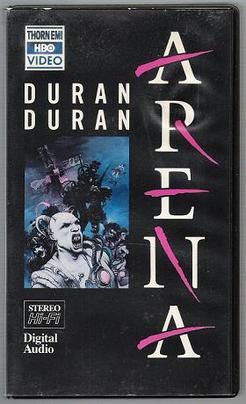
Arena (An Absurd Notion) is a concept concert video filmed during the course of Duran Duran's 1984 Sing Blue Silver North American Tour in support of the album Seven and the Ragged Tiger.

Diamond Dogs is the eighth studio album by the English musician David Bowie, released on 24 May 1974 through RCA Records. Bowie produced the album and recorded it in early 1974 in London and the Netherlands, following the disbanding of his backing band the Spiders from Mars and the departure of the producer Ken Scott. Bowie played lead guitar on the record in the absence of Mick Ronson. Diamond Dogs featured the return of Tony Visconti, who had not worked with Bowie for four years; the two would collaborate for the rest of the decade. Musically, it was Bowie's final album in the glam rock genre, though some songs were influenced by funk and soul music, which Bowie embraced on his next album, Young Americans (1975).
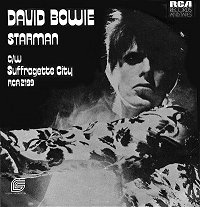
"Starman" is a song by the English musician David Bowie. It was released on 28 April 1972 by RCA Records as the lead single of his fifth studio album The Rise and Fall of Ziggy Stardust and the Spiders from Mars. Co-produced by Ken Scott, Bowie recorded the song on 4 February 1972 at Trident Studios in London with his backing band known as the Spiders from Mars – comprising guitarist Mick Ronson, bassist Trevor Bolder and drummer Mick Woodmansey. The song was a late addition to the album, written as a direct response to RCA's request for a single; it replaced the Chuck Berry cover "Round and Round" on the album. The lyrics describe Ziggy Stardust bringing a message of hope to Earth's youth through the radio, salvation by an alien "Starman". The chorus is inspired by "Over the Rainbow", sung by Judy Garland, while other influences include T. Rex and the Supremes.

And the Hippos Were Boiled in Their Tanks is a novel by Jack Kerouac and William S. Burroughs. It was written in 1945, a full decade before the two authors became famous as leading figures of the Beat Generation, and remained unpublished in complete form until 2008.
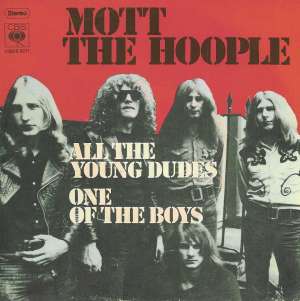
"All the Young Dudes" is a song written by English singer-songwriter David Bowie, originally recorded and released as a single by the English rock band Mott the Hoople in 1972 by Columbia Records. Bowie produced the song, which he had given to the band after they rejected his "Suffragette City". Bowie would subsequently record the song himself. Regarded as an anthem of glam rock, the song has received acclaim and was a commercial success. In 2021, Rolling Stone ranked "All the Young Dudes" number 166 in its list of the 500 Greatest Songs of All Time. It is also one of the Rock and Roll Hall of Fame's 500 Songs that Shaped Rock and Roll.
The Nova Trilogy or The Cut-up Trilogy is a name commonly given by critics to a series of three experimental novels by William S. Burroughs.
"Five Years" is a song by the English musician David Bowie, released on his 1972 album The Rise and Fall of Ziggy Stardust and the Spiders from Mars. Co-produced by Bowie and Ken Scott, it was recorded in November 1971 at Trident Studios in London with his backing band the Spiders from Mars − comprising Mick Ronson, Trevor Bolder and Mick Woodmansey. As the opening track on the album, the song introduces the overarching theme of the album: an impending apocalyptic disaster will destroy Earth in five years and the being who will save it is a bisexual alien rock star named Ziggy Stardust. While the first two verses are told from a child narrator's perspective, the third is from Bowie's, who addresses the listener directly. As the track progresses, it builds intensity, before climaxing with strings and Bowie screaming the title.
The Wild Boys may refer to:

"The Wild Boys" is the twelfth single by the English pop rock band Duran Duran, released on 22 October 1984 in the United Kingdom.
This is a bibliography of the works of William S. Burroughs.

Tarzan is a fictional character, a feral child raised in the African jungle by the Mangani great apes; he later experiences civilization, only to reject it and return to the wild as a heroic adventurer.

Ziggy Stardust is a fictional character created by English musician David Bowie, and was Bowie's stage persona during 1972 and 1973. The eponymous character of the song "Ziggy Stardust" and its parent album The Rise and Fall of Ziggy Stardust and the Spiders from Mars (1972), Ziggy Stardust was retained for Bowie's subsequent concert tour through the United Kingdom, Japan and North America, during which Bowie performed as the character backed by his band The Spiders from Mars. Bowie continued the character in his next album Aladdin Sane (1973), which he described as "Ziggy goes to America". Bowie retired the character in October 1973 after one final show at The Marquee in London.
